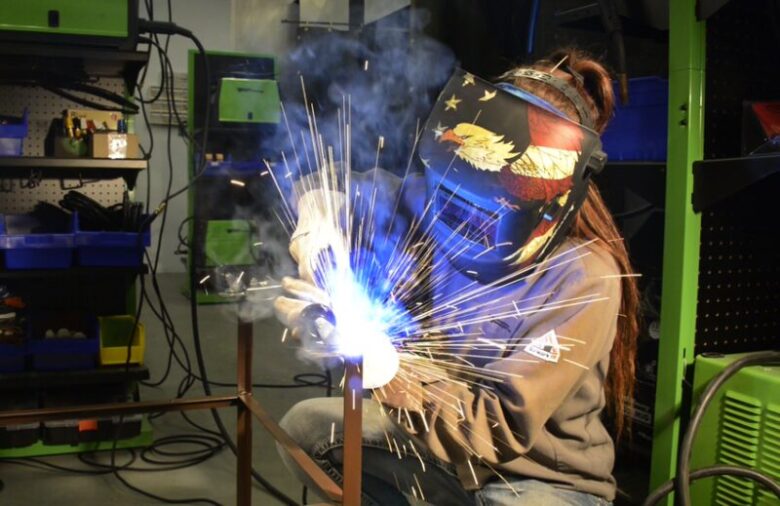Whether you’re fresh out of high school looking to start a career, or you’ve been in the workforce for 20 years and want to pivot into something else, a career in welding could be right for you.
The Benefits of a Career in Welding
It used to be that young people finish school and chose one of the many avenues into the real world. Some would immediately start working. Others would apprentice under a professional to learn a specific skill. Many would go to a trade school. Then a small fraction of the population would attend college.

source:allstatecareer.edu
Today, it seems as if things are reversed. Most people end up going to college, while only a percentage of high school graduates pursue other channels. And while there’s nothing wrong with getting a four-year college degree, it can be an unnecessary waste of time and effort, especially if you plan on going into a skilled trade post-graduation.
While everyone is different, it may behoove you to blaze your own trail and acquire a tangible trade skills. In particular, let us recommend a career in welding. Here’s why:
- Strong Demand for Welders
There will always be a strong demand for skilled welders – particularly when the economy is growing and manufacturing/construction is thriving. Over the last five years, welding has been one of the fastest growing niches in the American job marketplace – and this growth will continue into the future. According to the Bureau of Labor Statistics, there will be an additional 22,500 jobs open to welders from 2016 to 2026 (roughly 6 percent job growth).
If you’re looking for a career that will never lose relevance, welding is perfect. It’s a skill that’s been relevant for centuries and will continue to provide value for many decades to come.
- No Long-Term Educational Requirements
In a day and age where it can take four, eight, or 10-plus years to become educated enough to enter into certain careers, you’ll be happy to learn that you don’t need extensive education to get started in welding. Most welding diplomas can be earned in less than a year.
According to IMBC, which offers a welding technology diploma, “Students will start with basic welding applications and then proceed to more advanced, sophisticated welding techniques, including mig, tig, pipe, and structural metal welding. Courses also include destructive and non-destructive testing, and quality control to ensure that students have a thorough understanding of the field of welding and its applications across a variety of work settings.”
A welding diploma is just the start. Once you have the formal education under your belt, you’ll continue to add valuable skills and experience on the job.

source:adendorff.co.za
- Challenging and Exciting Work
Some careers simply ask professionals to go through the motions. Whether it’s filling out spreadsheets, answering phone calls, or compiling reports, repetition is the name of the game. But in welding, you never have to worry about getting bored.
Welding offers challenging and exciting work that’s always changing and evolving. You’re required to use both physical skills and your mind to complete unique projects that force you to constantly improve and grow.
- Optional Travel Opportunities
Skilled welders are in high demand. As you gain experience and create connections, new opportunities will emerge. Not only can you choose what industry you want to work in, but you can also select the setting. Do you prefer to work in a shop setting? Or do you like being outside where you can work on a shipyard or skyscraper?
Eventually, you may even come across opportunities to travel – domestically or abroad – for periods of time. If you’re young and single, this is the perfect opportunity to see the world on your employer’s dime.

source:allstatecareer.edu
Discover Your Ideal Career
Maybe you aren’t cut out to be a welder – that’s fine! But chances are, there’s another trade skill or career that you can pursue without a four-year college degree. Take some time to research the options that exist, set goals, and find out how you can begin moving toward these objectives. Within a matter of months, you could be on your way to a new and exciting career in a field that you’d never previously thought possible.

